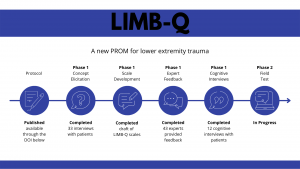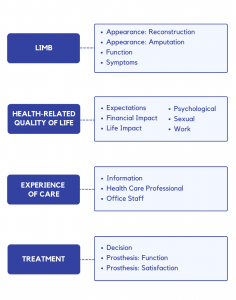BACKGROUND
Limb-threatening lower extremity traumatic injuries can be devastating events for patients. The impact of the injury and treatment can have a multifaceted impact on patients, with treatment spanning several months to more than a year. Capturing patient-reported outcomes in these patients is essential. To advance research in lower extremity trauma from the patient perspective, a specific and comprehensive patient-reported outcome measure (PROM) is needed. In addition to capturing outcomes in patients who undergo fracture fixation, and/or soft tissue debridement, the PROM should be capable of capturing outcomes in patients who require complex soft tissue reconstruction and/or undergo amputation. Additionally, development of the PROM using a modern psychometric approach will enable its use to inform clinical practice, improve care quality, and advance research. Our team received funding in 2017 and 2018 from the Duke Musculoskeletal Program and Surgical Center for Outcomes Research, as well as the Foundation of Orthopaedic Trauma for the development of this PROM, the LIMB-Q. Development of the LIMB-Q has the following aims:
- Identify concepts for the LIMB-Q in a qualitative study
- Establish content validity for the LIMB-Q through cognitive debriefing interviews and solicitation of expert opinion
- Revise and finalize the scales and determine psychometric properties of the LIMB-Q via an international field-test

PROGRESS TO-DATE
The LIMB-Q has been developed using international standards for PRO instrument development. Concepts were elicited from qualitative interviews in 33 patients in the United States after lower extremity trauma, including 18 patients who underwent amputation for their injuries. Qualitative data, along with literature review and expert opinion was used to generate a conceptual framework and the preliminary LIMB-Q. Content validity was then established through cognitive debriefing interviews with 12 patients and expert opinion collected from an international, multi-disciplinary group of 43 experts. An international field test began in Spring 2020 and is currently on-going. The LIMB-Q has been translated into Dutch and German and is currently being translated into Danish. The field-test study is being conducted at 5 sites internationally.
TIMELINE

LIMB-Q FRAMEWORK







